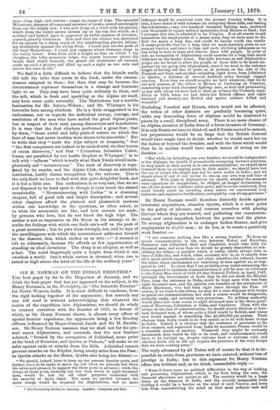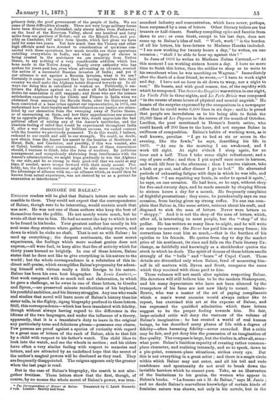SIR H. NORMAN ON THE INDIAN FRONTIER.*
THE best paper by far in the Magazines of January, and we think the best paper that has yet appeared on the subject, is Sir Henry Norman's, in the Fortnightly, on "The Scientific Frontier" for North-Western India. It is most difficult to condense, from
the rigid locking together of the arguments ; but scarcely any one will read it without acknowledging that whatever the merits of the expedition into Afghanistan, we should do wisely to content ourselves with the frontier of 1849, in favour of which, as Sir Henry Norman shows, is almost every officer of special frontier experience, the opponents being a few Bombay officers, influenced by Major-General Jacob and Sir H. Rawlin.
son. Sir Henry Norman assumes that we shall not for the pre- sent annex Afghanistan, and contends that the new frontier selected, "formed by the occupation of Jellalabad, some point at the head of Koorrum, and Quetta or Pisheen," will make us no safer against raids or attacks from the Hills. Jellalabad cannot prevent attacks on the Khyber, being ninety miles from the Pass ; or Quetta attacks on the Bolan, Quetta also being too distant :—
" We should, indeed, have to keep up our present frontier posts, and further, have to be ready to move up, not when we pleased, but when the adversary pleased, to support the three posts in advance ; while the troops at these posts, certainly not less than seven or eight thousand men, would be lost for all other purposes connected with the security of India itself. The more we pushed forward, the more troops would be required for Afghanistan, and no more • The Fortnightly Berkey for January. London : Chapman and Hall.
influence would be exercised over the present frontier tribes. It is true, I have heard of wild schemes for occupying these hills, and taming the inhabitants,—say, two hundred thousand fighting men, scattered over thousands of square miles of mountains, from Hazara to Sind ; but I presume this idea is admitted to be Utopian. It at all events would necessitate the employment of a larger army than we have seen in the field for many a long day, and could be hardly worth the candle It seems probable that for a long time we must maintain posts on our present frontier, and trust to time and such civilising influences as we can bring to bear to tame and educate these wild people. In point of fact, no occupation of Afghanistan could exercise for a long time much influence on the border tribes. The hills between us and Afghanistan proper are too broad to allow the people of those hills to be much im- pressed by our going into Afghanistan, even if we went to the extreme length of having one lino of posts, as at present, on the side of the Punjanb and Sind, and another extending right down from Jellalabad to Quetta, a distance of several hundred miles through rugged country. Even then we should acquire no hold whatever, that we do not now possess, of the tribes in Hazara or bordering on Yusufzai, numbering some forty thousand fighting men, as bold and persevering as any with whom we have had to deal, as witness the Umbeyla expe- dition in 1863, when we had thirty-six British officers and eight hundred and seventy-one British and native soldiers killed and wounded."
Excluding Yusufzai and Hazara, which would not be affected, the tribes of other districts are gradually becoming quiet, while any descending force of Afghans would be shattered to pieces by a small, disciplined army. There is no more chance of an Afghan invasion of India than of a Swiss invasion of Germany . It is only Russia we have to think of, and if Russia moved in earnest, her preparations would be so large that the British General would have ample time to decide whether he would meet her on the Indus or beyond the frontier, and with the force which would then be in motion would have ample means of acting on his decision :-
" But while, by defending our own frontier, we should be independent of the Afghans, we should, if prematurely occupying forward positions, be very much at their mercy as to our communications ; we should have irritated them by occupying posts in their midst ; we should have lost the use of troops who might any day be more useful in India; and we should place it out of our power to choose our own way and time of advance. With posts in Afghanistan we should, whether the moment were opportune or inopportune, be obliged, on danger threatening, to use all our moans to reinforce these posts, and however reinforced, they could hardly resist an invading army unless we constructed very elaborate and expensive fortifications, occupied by very strong garrisons."
Sir Henry Norman would therefore distinctly decide against territorial acquisitions, abandon Quetta, which is a mere point in the policy of advance, and content ourselves with placing Envoys where they are wanted, and perfecting our communica- tions, now most imperfect, between the passes and the plains. To occupy Afghanistan is to endanger Indian finance, and give employment to 40,000 men ; to do less, is to create a positively weak frontier :—
" I can conceive nothing less like a strong frontier. To keep up secure communication to the rear, between Kohat and Koorrum, Peahawur and Jellalabad, Sind and Candabar, would take fully six thousand men, and even then we should be greatly dependent on sub- sidising the tribes,—a practice which is costly, which always fails in time of difficulty, and which, when economy sets in, as it usually does after much lavish expenditure, and when subsidies are reduced, causes the tribes whose emoluments are vanishing to turn against us, as hap- pened in 1841. To show that I am probably even under-estimating the force required to maintain communications, it will be seen on reference to the Cabul Blue-book of 1842-43 that General Pollock, in April, 1842, informed the Government of India that he did not think the Khyber Pass, from the entrance to Daka, could be kept open with less than eight thousand men, and his opinion was founded on the statements of Major Mackeson, who had been eight times through the Pass. Of course, if we trust to the tribes, we may for a time dispense with troops to guard our communications, but such a course would be dangerous, probably costly, and certainly very precarious. No military authority would place less than seven or eight thousand men in the three garri- sons of Koorrum, Jellalabad, or Daka, and Candahar. Thus, with the troops on the line of communication, we should absorb thirteen or four- teen thousand men, of whom quite a third would be British, and whose cost would amount to something like £1,000,000 per annum. Their absence from India would in no way enable us to do with fewer troops in India. Indeed, it is obvious that the existence of garrisons so far from support, and separated from India by mountain Passes, would be a constant source of anxiety. Whenever they might be seriously threatened, they would be felt to be weak, and reinforcements would have to be hurried up, despite extreme heat or extreme cold, and whether India did or did not require the presence of the very troops that we were sending away."
The reply advanced by all Tories will of course be that it is im- possible to retire from provinces we have entered, without loss of prestige in India ; but to this argument Sir Henry Norman offers this brilliant and, as we think, unassailable reply :—
" Even if there were no political difficulties in the way of holding and governing Afghanistan, which is far from being the case, the financial objections are patent to all. The country would be a huge drain on the finances of India, and the anxiety inseparable from bolding it would be a harden on the mind of each Viceroy, and keep him from concentrating his mind on that most arduous task and primary duty, the good government of the people of India. We see some of these difficulties already. Three not very large military forces have been directed on Jellalabad, only ninety miles from Pesbawnr; on the head of the Koorrum Valley, about one hundred and forty miles from our garrison of Kohat ; and on the Khojak Pass, and pos- sibly on Candahar, 147 miles from Quetta, which last place we have held for some two years. Yet how much time the Viceroy and other high officials must have devoted to consideration of questions con- nected with these operations, how much trouble are these operations entailing everywhere in India, and what a legacy of claims is being created in the assistance we are receiving from Native States, to say nothing of a very considerable addition which has been made to the Native Army. Nearly every authority who has spoken for years past has, even when advocating an advance, scouted the notion of a successful Russian invasion of India ; and yet if our advance is not against a Russian invasion, what is its use ? Certainly it cannot be supposed that by forcing ourselves into their country we shall make the Afghans better disposed towards us. In all ways our doing this is calculated to weaken us. Politically, it em- bitters the Afghans against us ; it makes all India believe that our desire for annexation is still rampant ; and those who saw the intense satisfaction experienced by the Chiefs and Princes in India when we abstained from annexing the Baroda State, after the Guicowar had been convicted of a base clime against our representative, in 1875, can understand how their loyalty and their reliance on our justice are stimu- lated by our abstention from the sweeping away of Native States, or of encroaching on them, and how their apprehensions are aroused by an opposite policy. Those who saw this, would appreciate the bad political effect of seizing any of the Ameer's territories, and the absolute feeling of relief that would be experienced throughout India if, after a war characterised by brilliant success, we rested content with the frontier we previously possessed. To do this would, I believe, redound to our credit and add to our strength. We could, no doubt, now obtain from the Ameer his assent to the location of Residents at Herat, Balk, and Candahar, and possibly, if this was wanted, also at Cebu!, besides other concessions. But none of these concessions should, I venture to think, take the form of territory. By judicious management and scrupulously abstaining from interference with the Ameer's administration, we might hope gradually to win the Afghans to our side, and be so strong in their good-will that we could at any time, if needed, move troops forward with their ready assent. Pro- bably, too, the Ameer's successor might bo able more strongly to feel the advantage of alliance with us,—an alliance which, as would then be known from actual experience, was not desired by us as a pretext for annexation or interference."







































 Previous page
Previous page